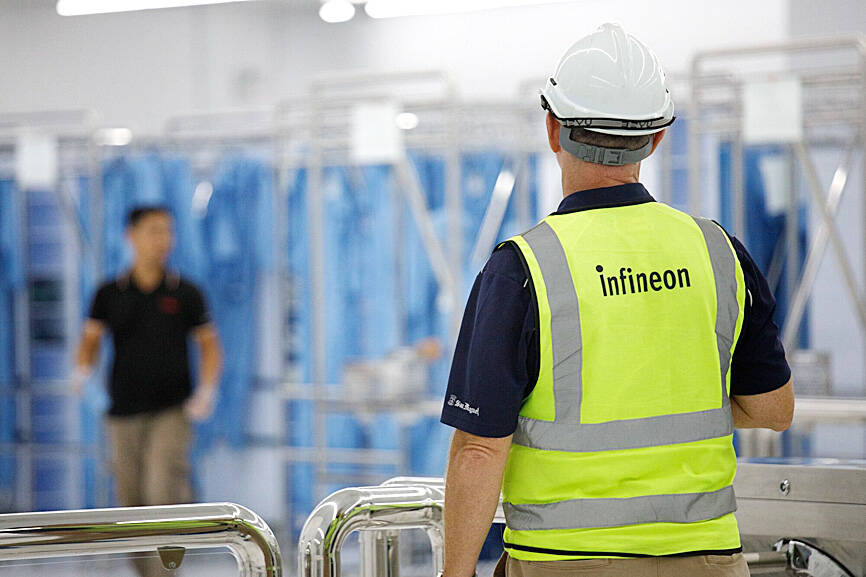Malaysia is gaining more heft in the global supply chain as Infineon Technologies AG opens a major semiconductor manufacturing complex in the country, the Southeast Asian nation’s prime minister said.
“We are now be able to receive and expand the technology. It shows Malaysia is now going up the ladder,” Malaysian Prime Minister Anwar Ibrahim said yesterday at the opening ceremony of the first phase of Infineon’s 7 billion euros (US$7.7 billion) production site in the northern Malaysian district of Kulim.
Anwar highlighted the need for the local governments and universities to help train the necessary talent to better accommodate Kuala Lumpur’s efforts to bulk up the local chip industry. This comes as major governments around the world are spending tens of billions to bolster the domestic production of semiconductors, a commodity that is regarded as one of the most strategic goods for nations to develop emerging technologies.

Photo: Bloomberg
Infineon chief executive officer Jochen Hanebeck said that the new Kulim campus progressed ahead of its original schedule and it would become the world’s largest silicon carbide power semiconductor manufacturing site once the second phase is completed.
The new plant is to focus on making power semiconductors that can help with decarbonization in the automotive, industrial and data center fields. It is expected to eventually create a total of 4,000 jobs, Infineon said.
Infineon’s investments in Malaysia highlight the Southeast Asian nation’s potential to attract more technology investments at a time when major chip firms are seeking alternatives to China and Taiwan for manufacturing given increasing geopolitical uncertainties.
Malaysia has in past years emerged as a global hub for packaging and assembling. Major players including Intel Corp and ASE Technology Holding Co (日月光投控) have taken advantage of its skilled and low-cost labor, and proximity to major markets.

Hon Hai Precision Industry Co (鴻海精密) yesterday said that its research institute has launched its first advanced artificial intelligence (AI) large language model (LLM) using traditional Chinese, with technology assistance from Nvidia Corp. Hon Hai, also known as Foxconn Technology Group (富士康科技集團), said the LLM, FoxBrain, is expected to improve its data analysis capabilities for smart manufacturing, and electric vehicle and smart city development. An LLM is a type of AI trained on vast amounts of text data and uses deep learning techniques, particularly neural networks, to process and generate language. They are essential for building and improving AI-powered servers. Nvidia provided assistance

GREAT SUCCESS: Republican Senator Todd Young expressed surprise at Trump’s comments and said he expects the administration to keep the program running US lawmakers who helped secure billions of dollars in subsidies for domestic semiconductor manufacturing rejected US President Donald Trump’s call to revoke the 2022 CHIPS and Science Act, signaling that any repeal effort in the US Congress would fall short. US Senate Minority Leader Chuck Schumer, who negotiated the law, on Wednesday said that Trump’s demand would fail, while a top Republican proponent, US Senator Todd Young, expressed surprise at the president’s comments and said he expects the administration to keep the program running. The CHIPS Act is “essential for America leading the world in tech, leading the world in AI [artificial

DOMESTIC SUPPLY: The probe comes as Donald Trump has called for the repeal of the US$52.7 billion CHIPS and Science Act, which the US Congress passed in 2022 The Office of the US Trade Representative is to hold a hearing tomorrow into older Chinese-made “legacy” semiconductors that could heap more US tariffs on chips from China that power everyday goods from cars to washing machines to telecoms equipment. The probe, which began during former US president Joe Biden’s tenure in December last year, aims to protect US and other semiconductor producers from China’s massive state-driven buildup of domestic chip supply. A 50 percent US tariff on Chinese semiconductors began on Jan. 1. Legacy chips use older manufacturing processes introduced more than a decade ago and are often far simpler than

Gasoline and diesel prices this week are to decrease NT$0.5 and NT$1 per liter respectively as international crude prices continued to fall last week, CPC Corp, Taiwan (CPC, 台灣中油) and Formosa Petrochemical Corp (台塑石化) said yesterday. Effective today, gasoline prices at CPC and Formosa stations are to decrease to NT$29.2, NT$30.7 and NT$32.7 per liter for 92, 95 and 98-octane unleaded gasoline respectively, while premium diesel is to cost NT$27.9 per liter at CPC stations and NT$27.7 at Formosa pumps, the companies said in separate statements. Global crude oil prices dropped last week after the eight OPEC+ members said they would